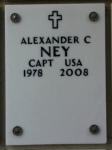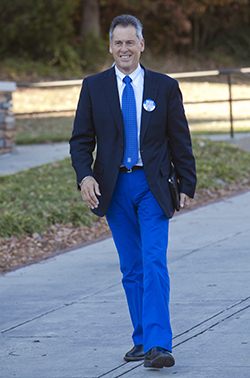 CPT Alexander Ney was assigned to A Battery, 2-319th Airborne Field Artillery Regiment when the 82nd Airborne Division deployed to Kuwait in support of Operation Iraqi Freedom (OIF). During the initial invasion, he accompanied the 1-325 Airborne Infantry Regiment in combat operations as a Fire Support Officer, earning a Bronze Star in the process. After a year long deployment, his unit returned to Fort Bragg, NC in January 2004.
CPT Alexander Ney was assigned to A Battery, 2-319th Airborne Field Artillery Regiment when the 82nd Airborne Division deployed to Kuwait in support of Operation Iraqi Freedom (OIF). During the initial invasion, he accompanied the 1-325 Airborne Infantry Regiment in combat operations as a Fire Support Officer, earning a Bronze Star in the process. After a year long deployment, his unit returned to Fort Bragg, NC in January 2004.
Just over a year later, by the fall semester of 2005, CPT Ney had been discharged from the Army in order to enroll as a medical researcher at Duke University School of Medicine. He spent about two years studying molecular cancer biology as a PhD student in the laboratory of Professor Donald McDonnell. Late in the evening of Wednesday, April 16, 2008, in the midst of his third year of studies, he was found dead at his home in East Durham. He left behind a wife and young child. Arlington National Cemetery is his final resting place, not far from his hometown of Washington, D.C.
 Earlier that same academic term, CBS had published the first national investigative report on veteran suicide, on November 13, 2007, a result of five months of journalism. The CBS report had, in fact, followed on the heels of efforts by Congress to address veteran suicide beginning as early as January 2007. That work produced the Joshua Omvig Veterans Suicide Prevention Act, which was signed into law one week before the CBS report was released.
Earlier that same academic term, CBS had published the first national investigative report on veteran suicide, on November 13, 2007, a result of five months of journalism. The CBS report had, in fact, followed on the heels of efforts by Congress to address veteran suicide beginning as early as January 2007. That work produced the Joshua Omvig Veterans Suicide Prevention Act, which was signed into law one week before the CBS report was released.
Despite this national attention on veteran suicide, Duke University had no resources in place for men and women like Alex who arrive on campus after reaching the end of their military service. This is noteworthy because of Duke’s proximity to two of the highest concentrations of veterans in the nation, according to Forbes, at Jacksonville/Camp Lejeune (#3, at 21.4% of the adult population) and Fayetteville/Fort Bragg (#7, at 20%).
More striking is the lack of any seeming effort on the university’s part to notify other students in light of Alex’s death or to seek out those who knew him in order to offer counseling and other support. Senior Vice President of Student Affairs Larry Moneta has, on multiple occasions, distributed campus-wide statements following the discoveries of student deaths, both on campus and off, regardless of academic standing, including:
- Junior Chris Sanders, who was found dead in his dorm in April 2007
- Senior Billy Dwight, who was found dead outside Durham County in April 2010
- Sophomore Alexander Rickabaugh & English PhD Kaila Brown, whose deaths fell within days of each other in September 2014

In each of the cases above, Moneta’s statements were distributed within 24 hours of the student’s death and included information on memorials to be held at Duke Chapel or elsewhere. There is, however, no record of Moneta sending an email to the student body regarding Alex’s untimely death. The only article that exists came four days after his death, giving the student body less than 24 hours notice before the April 21st memorial in Duke Chapel. The article offered no instructions for grieving students, veteran or otherwise, in need of counseling or psychiatric services.
In September 2008, for reasons that remain unverified, ROTC cadre, athletics department, and Student Affairs office facilitated a tailgate party for all military students and families before the annual Duke vs. Navy football game. The strong showing prompted a Duke Today article four months later, which mentioned Alex’s suicide but failed to name him. In it, Moneta reflected on Alex’s death, stating
I erroneously presumed that veteran support issues were at institutions with more non-traditional undergraduate learners and wouldn’t be a Duke issue… I discovered that’s not the case.
According to the article, Moneta’s office was 1) “pushing to formalize veterans’ programming as part of Duke’s new student orientation,” 2) working to identify incoming student veterans by adding “military status to the admissions information collected by Duke’s schools,” and 3) “designing a campuswide half-day workshop on serving veteran students.” Ten years after Alex’s death, none of these promises have been fulfilled, despite claims that Student Affairs has “connected with the VA Hospital and Counseling and Psychological Services at Duke to come up with an organized approach to serving students with military backgrounds.”
